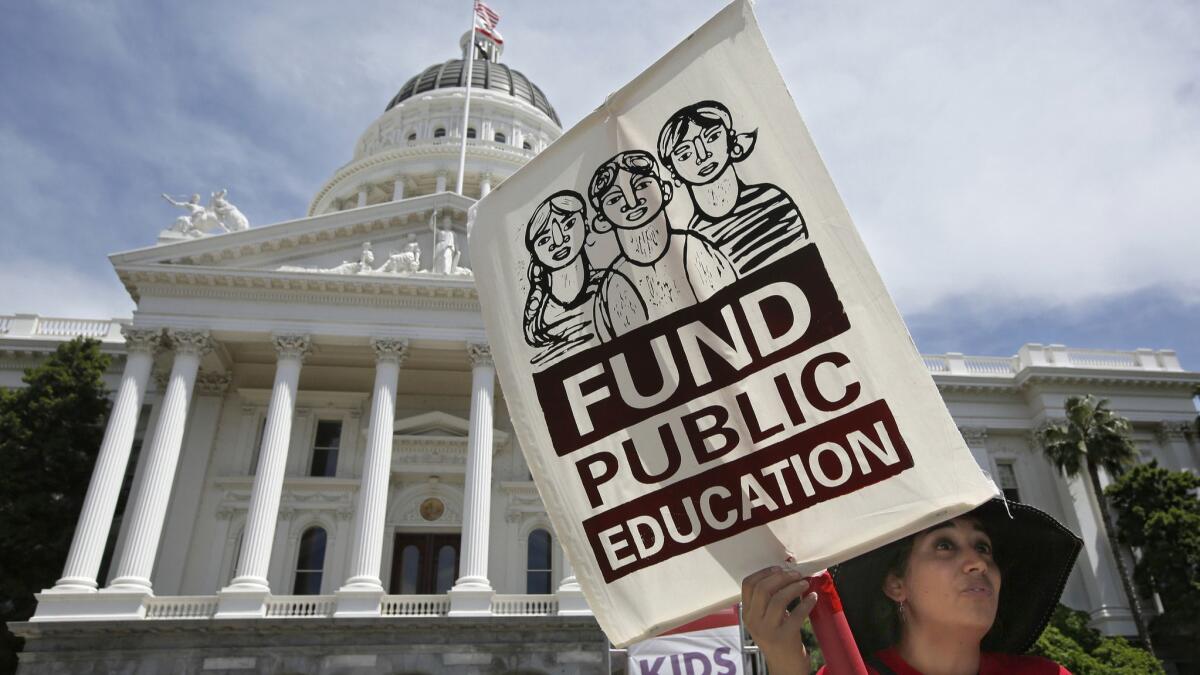Column: Two tax hikes for schools could end up on California’s 2020 ballot

- Share via
Reporting from Sacramento — Though it’s never a sure bet that California voters will sign off on a tax increase, the odds improve when the money is promised to schools. Less clear, though, is what happens if two school tax measures are on the same ballot — now a distinct possibility for next year’s statewide election.
Asking voters to weigh in on how to pay for education is hardly new, from the creation of the California Lottery in 1984 to the 1988 ballot measure that created strict constitutional funding formulas. A nonpartisan statewide poll released last month found that 59% of likely voters believe current public school funding isn’t sufficient. And while K-12 education is getting more money than ever before, a variety of long-term problems have left many California school districts in financial distress.
California’s education funding is at a record high. So why are schools short on cash? »
With that in mind, the California School Boards Assn. is strongly hinting it may draft a November 2020 ballot measure asking voters to impose $11 billion in new taxes for schools — specifically, a tax hike on corporate income over $1 million and on personal incomes above $1 million. A CSBA spokesman said additional details of the proposed taxes are still being hashed out.
“We’ve reached an inflection point,” Mike Walsh, the group’s immediate past president, said in a recent online video. “People are energized like no time in recent memory.”
It’s worth noting that some of the same high-income earners are still paying the higher rates extended by Proposition 55 in 2016 — money that was also promised to help improve schools.
At the same time, a different $11-billion tax increase, written by self-styled reformers such as the League of Women Voters and an alliance of liberal community groups, has already earned a spot on next year’s ballot. Also promised as a way to ensure smaller class sizes and better-paid teachers, as well as to help other government services, it would remove most commercial property from the strict tax limits established by 1978’s Proposition 13.
Limiting the property tax break to residential owners is a fight that’s been brewing for decades. Gov. Gavin Newsom said this year that he hopes to negotiate some sort of truce through a broader tax overhaul to head off the initiative, but there’s been no sign of compromise on the horizon in Sacramento.
Nor is there any indication that lawmakers are poised to boost school spending to the levels that education groups demand. Last week, as many as 2,500 people traveled to the Capitol to call for more cash for K-12 schools. But though the state budget is flush with a tax windfall, most of that revenue is assumed to be part of a short-term phenomenon — thus it wouldn’t boost education over the long haul.
Voters next year will be asked to help improve education in ways other than taxes. Legislators are considering a pair of multibillion-dollar bond measures for K-12 schools and higher education. If approved, the state would have to pay back that borrowing out of general tax revenue. Neither proposal, though, is likely to draw organized political opposition.
But the tax initiatives certainly would. And if they’re both on the ballot next year, they’ll probably share something in common besides education: vocal, well-funded opposition by the business community. Powerful groups already poised to fight the property tax measure would no doubt lump the two initiatives together, arguing they would amount to a double-barreled attack on the state’s business climate and push more companies to pack up and move somewhere else.
What happens next is unclear. The large and boisterous crowd that marched at the state Capitol last week helped reinforce the idea that California schools are at a crossroads. Whether that’s a good enough reason for new taxes, though, is another question.
Follow @johnmyers on Twitter and sign up for our daily Essential Politics newsletter
More to Read
Get the L.A. Times Politics newsletter
Deeply reported insights into legislation, politics and policy from Sacramento, Washington and beyond. In your inbox twice per week.
You may occasionally receive promotional content from the Los Angeles Times.










